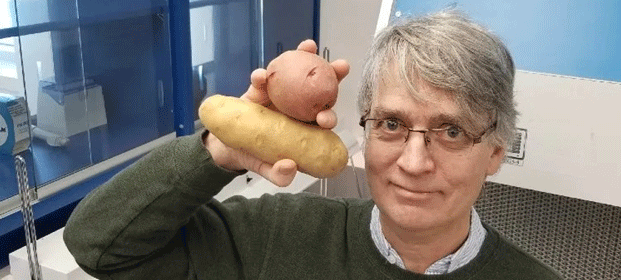Potato Cancer: A Threat to Crops and the Economy
Potato cancer, caused by the fungus Synchytrium endobioticum, is a serious problem for agriculture. Its spores can remain in the soil for more than 40 years, causing tuber deformities and making the crop unsuitable for the market. Although there is no threat to human health, the economic damage to farmers is enormous, since affected fields become unsuitable for potato growing.
After the discovery of potato cancer in Prince Edward Island (Canada), strict restrictive measures were introduced, but the disease remains a serious challenge for the industry. The Canadian Food Inspection Agency (CFIA) and Agriculture and Agri-Food Canada (AAFC) have stepped up research to find effective methods of combating this fungus.
Genetics against potato cancer
The key to fighting the disease may be hidden in the genes. Scientist Dr. Huy Nguyen from the Ottawa Research Centre (AAFC) is studying the genome of the potato wart pathogen to understand its infection mechanisms and vulnerabilities.
“Genome sequencing helps us develop tools to detect the pathogen and potential methods to neutralize it,” says Dr. Nguyen.
In collaboration with Dutch scientists, his team has already sequenced several potato wart genomes. This discovery is an important step in the global fight against the disease and has cemented Canada’s position as a leader in potato wart genomic research.
The “pan-genome” being developed will allow us to combine information on all potato wart varieties, which will help create more effective diagnostic tools and develop resistant varieties.
Creating resistant potato varieties
Since it is not yet possible to eradicate the pathogen, scientists are betting on developing resistant potato varieties.
Dr. David De Kooyer and his team from the AAFC National Potato Breeding Program are working to identify DNA markers associated with resistance to potato wart.
Resistant table varieties have already been identified, including red and blush varieties, but there are no resistant varieties for French fries and chips. Work in this area is ongoing with the support of the Prince Edward Island Potato Growers Council.
The combination of Dr. Nguyen’s genetic research and Dr. De Kooyer’s breeding work will accelerate the development of new resistant potato varieties.
Avondale – a unique testing ground for research
The only place in the world where potato wart can be studied in real-life conditions is the Avondale Research Farm in Newfoundland and Labrador.
This is a field lab where the pathogen is present in the soil, making it uniquely positioned to study different types of potato wart and methods for its control.
In 2021, following new outbreaks of the disease, AAFC upgraded the farm with:
– New gates and fencing
– Improved water systems
– Expanded research areas
Dr. Linda Jewell and Dr. Tobias Langle, along with biologist Mohsin Zaidi, are testing new resistant varieties, as well as different fungicides and biologics to combat the pathogen.
“We are joining forces to find effective strategies to combat potato wart – the process will take time, but we are getting there,” says Dr. Jewell.
What’s next?
Canadian scientists are working on a three-tiered approach to combat potato wart:
1️⃣ Developing new diagnostic methods for early detection of the disease.
2️⃣ Breeding resistant potato varieties that will limit the spread of the pathogen.
3️⃣ Testing new methods of protection, including biologicals and improved soil management methods.
This research will help not only Canada, but also other countries facing potato cancer.
Do you think genetics can completely protect potatoes from this threat? Share your opinion!







